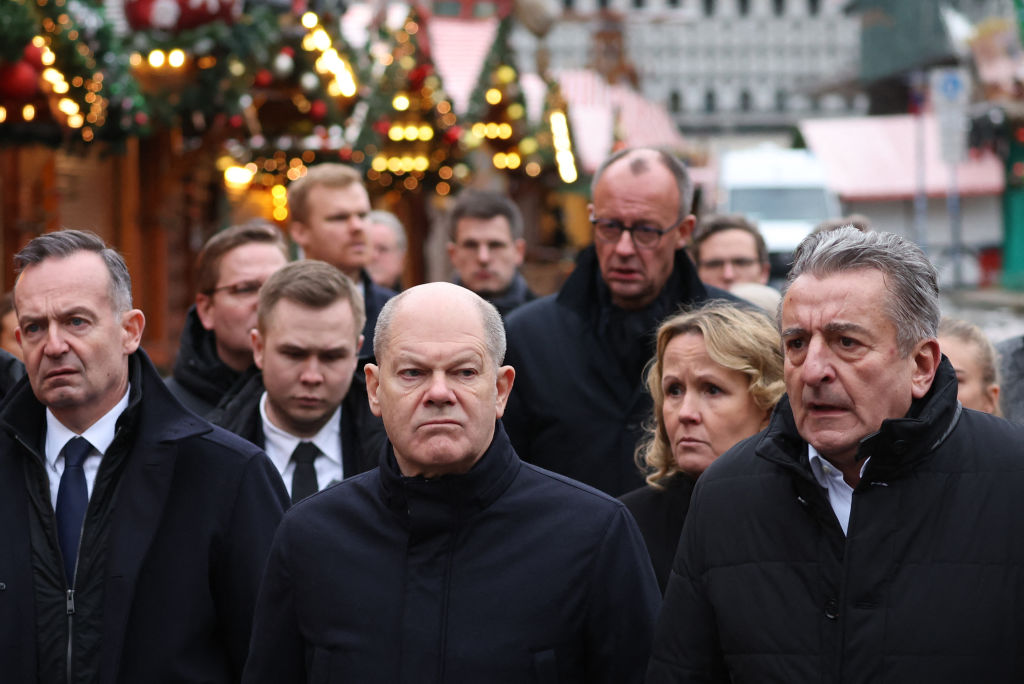Friday’s attack on a Christmas market in the German city of Magdeburg has so far left five dead, hundreds injured, and the script for the country’s February snap election in tatters.
The suspected perpetrator, a 50-year-old doctor from Saudi-Arabia who sought asylum in Germany and has lived there for two decades, was arrested at the scene. As a consequence, a historically short election campaign season will be centred largely around migration. On social media, a debate is already raging as to whether the attack should be treated as a further example of migrant violence or a far-Right hate crime.
As more details emerge, the Alternative für Deutschland (AfD) candidate for chancellor, Alice Weidel, is expected tomorrow to join a rally at the scene of the attack. On the other side, a demonstration against the far-Right is set to take place in Magdeburg this evening. “Everyone is welcome,” the organisers state, “except for Nazis.” And as Olaf Scholz calls for “togetherness in the face of hate”, Elon Musk has demanded the immediate resignation of the Chancellor, labelling him an “incompetent fool”.
It was only last Monday that Scholz lost a no-confidence vote in the Bundestag, allowing elections to take place in February rather than September. With deindustrialisation in full swing, the cost of living rising, and an energy crisis becoming increasingly apparent following attempts to phase out nuclear power, coal, and Russian gas simultaneously, the stage seemed set for an election focusing on Germany’s near-catastrophic economic downturn.
Would the current Green Minister of the Economy, Robert Habeck, serve in the same function in a conservative-led cabinet? Would the next government bring an end to the notorious debt ceiling enshrined in the German constitution? Would there be a broad majority for raising the minimum wage and finding a way to rein in exploding health insurance costs?
With the exception of the centre-right Christian Democratic Union (CDU) and its Bavarian sister party (CSU) — which feature clear proposals for a “turn in migration policy” in their 10-point election plan — Germany’s political establishment seemed relieved to avoid a difficult conversation around migration.
In particular, the country’s centre-left has been committed to keeping the controversial topic of migrant influxes out of the headlines. Scholz’s Social Democrats (SPD) decided to largely downplay the issue in their platform, discussing migration as a problem of the past. Stipulating that immigration “numbers have been brought down”, the programme addresses the issue as bullet point 20 out of 25, promising a “modern immigration society”.
A similar attempt to block out a comprehensive discussion of migration is notable in the Green election manifesto, to the extent that it is only mentioned in relation to other issues. The document put forward by “Team Robert” refers to the topic in a section on “Skilled workers for a modern economy”. Even syntactically, the topic is presented as an afterthought: “And we must ensure that the best skilled workers can and want to come to us easily — with simplified immigration procedures.”
Further away from the centre, on both the Left and the Right, the outlook is very different. The AfD and the newly established Bündnis Sahra Wagenknecht (BSW) have both capitalised on the unwillingness of large swathes of the political mainstream to take migration seriously. Weidel has made cracking down on immigration a central element of her platform, and as a result is now more popular than any of the other chancellor candidates — though she remains unlikely to take on the role because of other parties’ refusal to enter a coalition with the AfD.
Opinion polls frequently point to migration as the second-most important problem facing Germany, after its economic woes. Friday’s Christmas market attack is thus certain to have significant political ramifications, given that it has highlighted the feeling of insecurity which sunk Scholz’s coalition and ended the governing parties’ silence around immigration.
This will likely benefit Christian Democratic candidate for chancellor Friedrich Merz, who reminded the public yesterday that “once again, innocent people are becoming victims of conflicts that are being carried out in Germany.” At the same time, it will also almost certainly boost Germany’s anti-establishment parties, whose most forceful talking point has again been injected into the heart of the country’s political debate.










Join the discussion
Join like minded readers that support our journalism by becoming a paid subscriber
To join the discussion in the comments, become a paid subscriber.
Join like minded readers that support our journalism, read unlimited articles and enjoy other subscriber-only benefits.
Subscribe